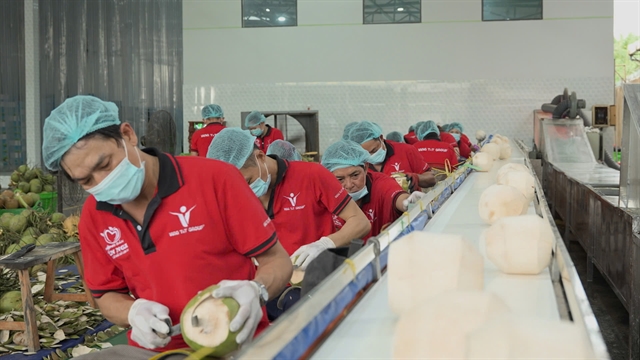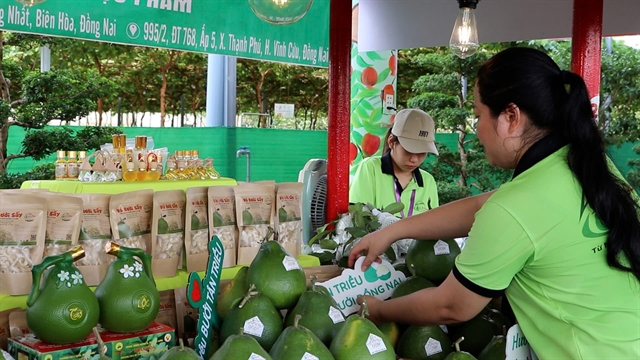As the year draws to a close agricultural businesses across Việt Nam are prioritising the fulfilment of export orders, showcasing the nation’s strength in farming and agricultural production.

HCM CITY — As the year draws to a close agricultural businesses across Việt Nam are prioritising the fulfilment of export orders, showcasing the nation’s strength in farming and agricultural production.
Nguyễn Đình Tùng, chairman and general director of Vina T&T Group, one of Việt Nam’s leading fruit exporters, told Việt Nam News that the company has been working tirelessly in the final quarter to export a wide range of fruits, catering to increased demand for year-end holidays such as New Year and Tết (Lunar New Year), celebrated by Asian communities in importing countries.
“Orders in October and November have risen by approximately 20–25 per cent compared to the yearly average to meet demand during this peak period.
“We are also investing in upgrading our packaging facilities to better serve the anticipated growth in 2025, which I believe will see substantial increases in fruit and vegetable exports.”
The company exports products such as coconuts, pomelos, durians, longans, mangoes, rambutans, star apples, and more to key markets like the US, China, Japan, South Korea, Canada, and Australia.
Meanwhile, Sao Khuê Food JSC, which specialises in pasta, glass noodles, instant noodles, and eco-friendly rice straws made from ingredients like rice and purple sweet potatoes, has also experienced a surge in demand.
These products are exported to destinations including Japan, Australia, and the US.
Phạm Thị Ngọc Hà, sales manager of Sao Khuê Food JSC, said: “As of the end of this year we have received a significant number of orders, and our factory is operating at full capacity to ensure timely delivery.”
She attributed this success to the company’s participation in a recent exhibition, where they secured contracts with several international partners.
Looking ahead the company anticipates even more orders in the coming year.
Trần Thị Hải Châm, head of distribution at MD QUEENS JSC, noted that her company’s MD Queens Celastrus Hindsii tea is produced both for the domestic market and unofficial-quota exports to Taiwan (China), the US, China, and Malaysia.
“Year-end demand, especially during the Tết period, is typically much higher than at other times of the year.
“As a result, our production has increased significantly, with revenues for this period two to three times higher than in the same period last year.”
Part of global supply chains
As a country with a long agricultural heritage, Việt Nam enjoys a competitive edge in exporting fresh produce and processed products derived from crops.
In the first 11 months of 2024 agricultural exports reached $29.78 billion, a year-on-year increase of 23.2 per cent.
Fruit and vegetable exports have also seen notable growth, with projected revenues for the full year exceeding $7 billion, a new record.
Industry experts have highlighted the steady improvement in Việt Nam’s agricultural product quality, not just in terms of flavour but also packaging and appearance.
Farmers are increasingly prioritising quality over quantity, making their produce more competitive in global markets.
As a result, processed food products made from these crops are also gaining traction with international buyers.
“Việt Nam’s strength lies in the exceptional cultivation skills of our farmers, who can quickly adapt to market demands,” Tùng said.
“We produce fruits year-round, which gives us an advantage over other countries in the region.
“By 2025 I believe Vietnamese fruit exports will achieve significant breakthroughs as evidenced by the impressive growth we have already witnessed in recent years.”
Exporters are keenly aware of the need to meet international standards in traceability, environmental protection and food safety.
Companies exporting to demanding markets like the US, Japan and Australia have focused on obtaining certification such as Global GAP, SMETA (Sedex Members Ethical Trade Audit), HACCP (Hazard Analysis and Critical Control Points), and Halal.
Moreover, many firms are embracing green and low-emission production methods, which are increasingly becoming a basic requirement in global markets.

Supportive policies
Recognising the pivotal role of agriculture in Việt Nam’s economy, the government and local authorities have introduced policies and programmes to foster its development.
Initiatives include simplifying export procedures, offering preferential loans for high-tech and sustainable production, keeping businesses informed about the latest market trends, encouraging farmers to join co-operative groups, and developing large-scale specialised farming areas.
Major cities like HCM City and Hà Nội regularly organise trade fairs and exhibitions to promote Vietnamese agricultural products, some of which attract leading international companies.
The “Business Matching and HCM City Products Week 2024 – Food and Beverages” expo held from December 11 to 17 provided an opportunity for businesses to showcase their brands to export partners, sourcing companies and consumers.
Trần Thị Hải Châm, who attended the event to promote her tea products, said the Investment and Trade Promotion Centre of HCM City had been instrumental in helping her company participate in major trade facilitation events.
Vietnamese firms have also been attending lots of international trade fairs.
Sao Khuê Food JSC exhibited at the Malaysia International Halal Showcase earlier this year, and successfully connected with several buyers.
Việt Nam has also benefited from a series of bilateral and multilateral trade deals like the United Kingdom–Việt Nam Free Trade Agreement, the European Union–Việt Nam Free Trade Agreement, and the Comprehensive and Progressive Agreement for Trans-Pacific Partnership.
These FTAs have eliminated tariffs on many product categories, particularly agricultural goods, creating opportunities for exporters to strengthen their global presence.
For example, Việt Nam’s agricultural exports to the UK have grown significantly over the past three years, partly due to the competitive edge provided by the UKVFTA.
Tùng noted that his company was among the first to benefit from the EVFTA.
“The agreement has made Vietnamese products more attractive to EU importers, who are now paying greater attention to our market.”
Nevertheless, while trade agreements provide a foundation, it is up to Vietnamese businesses to meet the stringent requirements of these demanding markets, he said.
“For markets like the EU, we must build a robust infrastructure, including certified farming areas and advanced packaging facilities, to succeed.” VNS






